
One benefit of attending a major research university is access to a wealth of undergraduate research opportunities.
At Notre Dame, students have the chance to study with internationally-recognized professors who are passionate about the joy of discovery. And in addition to a passion for their subject, students and professors alike are committed to conducting research that makes a difference in the world. From machine learning, which can help us understand and diagnose diseases, among other uses, to studying refugee resettlement with the goal of peace-building—every project has a greater purpose.
Scroll to see what five of our students are researching right now.
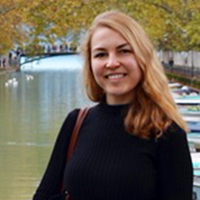
MK Kriscovich ’20
Majors: French, Finance
Minor: European Studies
My Research:
My research project focuses on social enterprise institutions in France. As a finance and French major, I love both disciplines and am very interested in international business. More specifically, I am seeking to understand what motivates businesses and individuals, particularly in France, to pursue social enterprise, and how their motivations may differ from Corporate Social Responsibility efforts at other for-profit institutions. Through my research, I have had the opportunity to travel to France for two one-week trips to interview and learn from social business owners and large organizations that work with social businesses in France.
How I Got Started:
My sophomore year at Notre Dame, I had the opportunity to hear Nobel Laureate Mohammad Yunus speak on campus about his experience with microfinancing institutions, and I became very interested in social businesses and their ability to shape the world for the better. After my semester abroad in Angers, France, I had a very strong desire to combine my interests in business, service, and French culture into one research project. I learned about the European Studies program at the Nanovic Institute and was able to work with them to secure funding and develop my research.
What I’ve Learned:
My research project has not only taught me how to seek out resources and put in the work in order to pursue what I am passionate about, but it has been very valuable from an educational and cultural standpoint. I have been able to learn about how businesses operate in France, as well as understand important differences between cultural attitudes in France and the US. Additionally, designing my own research project and applying for funding was a great experience that taught me a lot about personal accountability and the research process in general.
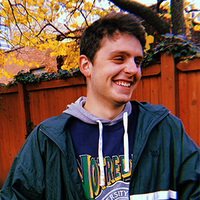
Dominic Bozzo ’20
Major: Computer Science
Minor: Engineering Corporate Practice, Energy Studies
My Research:
I classify my ‘research’ as a community based application of engineering knowledge and practices. Rather than working in a laboratory on a singular, concise project, I am part of a group that applies various skills in computer science and mechanical engineering to projects for local individuals and small businesses. My group is led by Dr. Paul Brenner, researcher and director of the Center for Research Computing here at ND. Our meeting space is located in the Center for Research Computing, but we work within various maker spaces on campus and on client sites. We have created and repaired adaptive toys for the Pediatric Therapy unit at St Joseph’s Hospital, manufactured speakers and custom wheelchair attachments, and more. We do so because we believe in the power of our engineering degrees to inspire good and create positive change, and we value the improvements that we are able to make in the lives of others.
How I Got Started:
I got involved with this opportunity through a recommendation from a friend who was already involved. An avid and engaged student herself, she was able to introduce me during my sophomore year.
What I’ve Learned:
This experience has been invaluable to my time at Notre Dame, as it emphasizes the value our community places on service and character. With the Notre Dame mission in mind, an engineer must strive to innovate not only for academic advancement, but for the formation of an authentic human community. My group aims to apply our engineering knowledge to the needs of individuals in our community, and we continually achieve academic and personal growth through doing so.
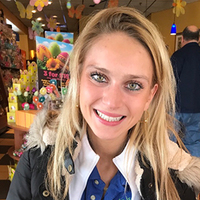
Madeline Owen ’21
Major: Neuroscience and Behavior (Pre-med)
Minor: Poverty Studies
My Research:
My research is conducted under the mentorship of Dr. Loan Bui in the lab of primary investigator Dr. Donny Hanjaya-Putra. The Hanjaya-Putra lab investigates the roles of stem cell morphogenesis and molecular therapeutics.
Through Notre Dame’s Hanjaya-Putra lab, I study the role of stem cell engineering in vasculature formation, specifically how targeted stem cell delivery repairs damaged endothelial cells of blood vessels under conditions of diabetes mellitus. With diabetes mellitus affecting individuals from a variety of backgrounds, this research seeks to offer regenerative therapies that can rejuvenate endothelial cell function and help those affected return to living healthy, functional lives. The stem cell research we are conducting has been presented at a variety of national conferences, and I have received personal publication of my contributions by UReCA: The National Collegiate Honors Council Journal of Undergraduate Research and Creative Activity.
How I Got Started:
As my undergraduate pre-med studies and activities developed, I gained a deep interest in regenerative medicine and clinical stem cell therapies. Seeking a lab that would allow me to contribute to applicable stem cell studies and develop my interests into real-world, hands-on applications, I discovered Notre Dame’s Hanjaya-Putra lab and committed myself to his team’s efforts in cutting-edge research. Directly contributing to research in clinical stem cell therapies – such as those treating diabetes – is incredibly inspiring and has allowed me to begin acting upon my passion to serve others through medicine, offering opportunities to alleviate pain and suffering from injury and disease.
What I’ve Learned:
Through Notre Dame, I have been a research team member in several on-campus labs and one lab at Trinity College in Dublin, Ireland, and each lab has provided its own unique opportunities to apply knowledge learned in the classroom to hands-on work. Conducting research has taught me patience when receiving unexpected results, tenacity and a sense of ingenuity when troubleshooting, the depth of knowledge necessary to move a project forward, and an understanding of the important and inspiring role of professional researchers in our world today. Working at the intersection of biomedical research and clinical therapy applications in blood vessel repair is supporting my goal of relieving patients’ pain and suffering through the application of novel clinical therapies. Engaging in research as an undergraduate has significantly enhanced my critical thinking skills by applying classroom skills to real-life scenarios, and has supported my goal of acting as a force for good by working to offer relief to the many individuals who suffer daily.
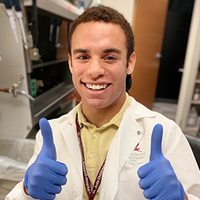
Jonathan Couri ’22
Major: Biological Sciences
Minor: Studio Art
My Research:
This past summer, I was in the Hatley Lab at St. Jude Children’s Research Hospital in Memphis, TN. Their lab is interested in the rare mechanisms of rhabdomyosarcoma (RMS), the most common soft tissue childhood sarcoma. RMS has a poor prognosis and its therapeutic options are limited. For ten weeks, I not only spent my time exploring the biological role of microRNAs in pediatric solid tumors but I also got to work on a subproject that identified diagnostic, prognostic, and therapy-predictive biomarkers in RMS.
How I Got Started:
Notre Dame’s College of Science website actually prompted my exploration for summer research opportunities. I was trying to find an experience at St. Jude because my hometown is a large Midwest affiliate, and I have always been inspired by their devotion to care for and support children with cancer regardless of their family’s financial situation. I knew St. Jude had the official Pediatric Oncology Education (POE) program, which is a great opportunity for students preparing for careers in the sciences to gain biomedical and oncology research experience. However, you have to be in your sophomore year to apply. Since I still wanted to work with them, I reached out to Notre Dame’s Center for Career Development and was able to get in contact with St. Jude’s Predoctoral Coordinator to see if there were any research opportunities for students in their freshman year. I sent her my resume, cover letter, and a letter of recommendation, and luckily, my interests matched with Dr. Hatley.
What I’ve Learned:
The real life experience in the laboratory of a physician scientist studying the fundamental biology of human disease allowed me to gain exposure to the scientific method, experimental design and basic aspects of oncology. As I assisted both technicians and postdoctoral fellows with mouse genotyping, molecular cloning, and cell culture, I got to obtain basic skills in molecular biology, cell biology, and developmental biology. However, this summer was truly valuable to me because I gained proficiency in skill that is not technical — contentment. Research takes time, as there is a lot of trial and error. Being a goal-oriented person, I sometimes lose sight of the power of contentment. I am so focused on the end result that I forget about the little things that make a difference. In the last few weeks of my internship, I figured out that the goal is not always the most important part of the whole experience — it’s the journey. It’s all about enjoying the simple things along the way, whether that be growing cells in the tissue culture room or talking about pediatric body tumors over lunch. Coming to this conclusion has allowed me to fully immerse myself in anything and everything I do, while still keeping the end goal in mind.
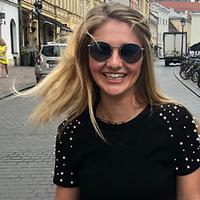
Brooke Ferrer ’21
Major: Marketing
Minor: Constitutional Studies
My Research:
The research I am working on pertains to food consumption. Consumers often engage in experiences with the presence of food they plan to consume at a later point in time. For instance, diners at a buffet might eat their main dish in the presence of their dessert. Concert attendees might listen to a concert in the presence of a mouth-watering snack that they wait to consume until the show’s intermission. Existing research has shown that the presence (vs. absence) of food positively affects the enjoyment of the food once it is consumed. However, in this research, we have been investigating how the presence of food affects the enjoyment of the ongoing consumption experience.
How I Got Started:
I had marketing professor Emily Garbinsky for my Principles of Marketing class my sophomore year at Notre Dame. She was a fantastic professor and I really enjoyed learning about her research in the class. The part of marketing that excites me the most is consumer psychology, which is Professor Garbinsky’s expertise. Therefore, when she opened applications for research assistants at the end of the semester, I knew that I had to apply!
What I’ve Learned:
I have learned so much through my work with Professor Garbinsky. By helping run field test, conduct literature reviews, analyze data and connect with coauthors, I have sharpened my analytical and interpersonal skills that will help me with any future career I choose. This work has truly made me value the research process, as well as appreciate any and all research that gets published.
Learn More
Ready to dig into research opportunities at Notre Dame?
- Check out the Flatley Center for Undergraduate Scholarly Research to get started.
- Each college and school at Notre Dame is home to centers and institutes that facilitate student research. Visit individual college websites to learn more through the College of Arts and Letters, the College of Engineering, Mendoza College of Business, the College of Science, and the School of Architecture.
- Notre Dame students go on to conduct research after graduation through prestigious international programs, such as Rhodes and Fulbright.
Originally published by at admissions.nd.edu on December 10, 2019.